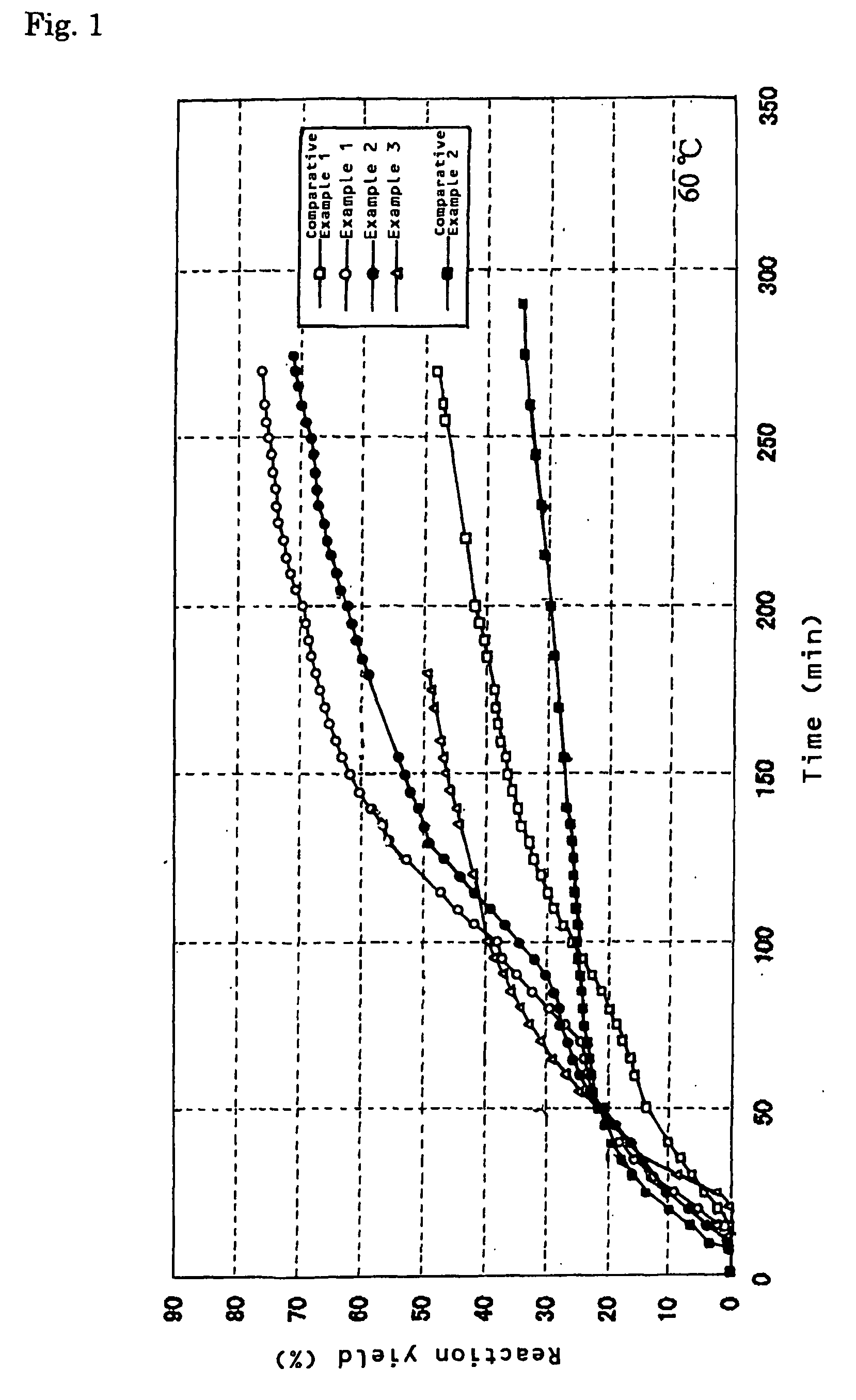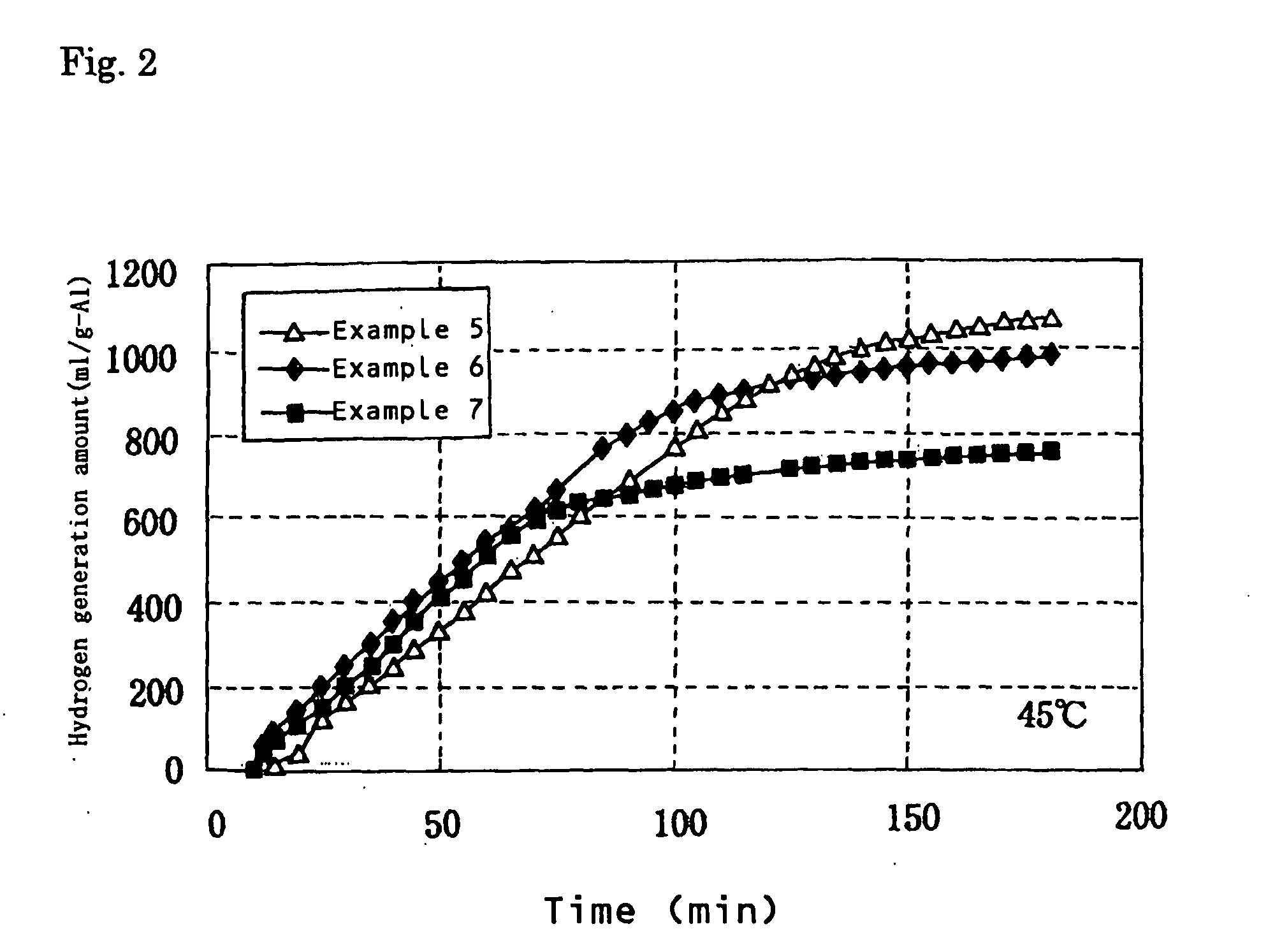Hydrogen Generating Composition
a technology of hydrogen generating composition and hydrogen gas, which is applied in the direction of explosives, other chemical processes, cell components, etc., can solve the problems of difficult control of the reaction rate of reacting water and aluminum, the suppression of the proton conducting function, and the inability to control the reaction rate. achieve the effect of effective hydrogen gas generation and high reaction ra
- Summary
- Abstract
- Description
- Claims
- Application Information
AI Technical Summary
Benefits of technology
Problems solved by technology
Method used
Image
Examples
example 1
[0041]One gram of an aluminum powder (manufactured by Kojundo Chemical Laboratory Co., Ltd.: average particle diameter 3 μm), 0.23 g of carbon black (manufactured by Cabot Corporation: Vulcan XC-72R, average particle diameter 20 nm), and 0.015 g of calcium oxide (Wako Pure Chemical Industries, Ltd., A-12112, powder reagent) were placed into a 20 cc beaker and mixed, and the mixture was placed in a vessel in hot water, and retained at a temperature of 60° C. While water was supplied with a microsyringe pump at a supplying rate of 1.0 ml / h (a total supply amount water was 3.0 ml), a generated gas was taken out through a tube. Thereupon, a generation amount was measured with a mass flowmeter while hydrogen was collected by a water displacing method. A change with time in a reaction yield obtained from a hydrogen generation amount thereupon is shown in FIG. 1. A reaction yield when 150 minutes had passed from initiation of water supply was 62%. Like this, by using carbon black jointly, ...
example 2
[0042]One gram of an aluminum powder (manufactured by Kojundo Chemical Laboratory Co., Ltd.: average particle diameter 3 μm), 0.23 g of carbon black (manufactured by Cabot Corporation: Vulcan XC-72R, average particle diameter 20 nm), 0.015 g of calcium oxide (Wako Pure Chemical Industries, Ltd., A-12112, powder reagent), and 0.05 g of potassium chloride were placed into a 20 cc beaker and mixed, and the mixture was placed in a vessel in hot water, and retained at a temperature of 60° C. While water was supplied with a microsyringe pump at a supply rate of 1.0 ml / h (a total supply amount of water was 3.0 ml), a generated gas was taken out through a tube. Thereupon, a generation amount was measured with a mass flowmeter while hydrogen was collected by a water replacing method. A change with time in a reaction yield obtained from a hydrogen generation amount thereupon is shown in FIG. 1. A reaction yield when 150 minutes had passed from initiation of water supply was 52%. Like this, by...
example 3
[0043]One gram of an aluminum powder (manufactured by Kojundo Chemical Laboratory Co., Ltd.: average particle diameter 3 μm), and 0.015 g of calcium oxide (Wako Pure Chemical Industries, Ltd., A-12112, powder reagent) were placed into a 20 cc beaker and mixed, and the mixture was placed into a vessel in hot water, and was retained at 60° C. While water was supplied with a microsyringe pump at a supply rate of 1.0 ml / h (a total supply amount of water was 3.0 ml), a generated gas was taken out through a tube. Thereupon, a generation amount was measured with a mass flowmeter while hydrogen was collected by a water replacing method. A change with time in a reaction yield obtained from a hydrogen generation amount thereupon is shown in FIG. 1. A reaction yield when 150 minutes had passed from initiation of water supply was 48%.
PUM
 Login to View More
Login to View More Abstract
Description
Claims
Application Information
 Login to View More
Login to View More - R&D
- Intellectual Property
- Life Sciences
- Materials
- Tech Scout
- Unparalleled Data Quality
- Higher Quality Content
- 60% Fewer Hallucinations
Browse by: Latest US Patents, China's latest patents, Technical Efficacy Thesaurus, Application Domain, Technology Topic, Popular Technical Reports.
© 2025 PatSnap. All rights reserved.Legal|Privacy policy|Modern Slavery Act Transparency Statement|Sitemap|About US| Contact US: help@patsnap.com


